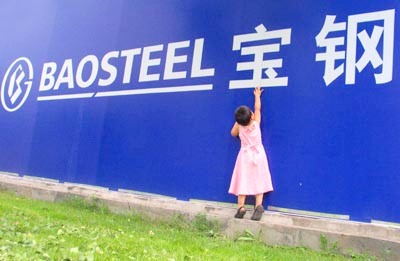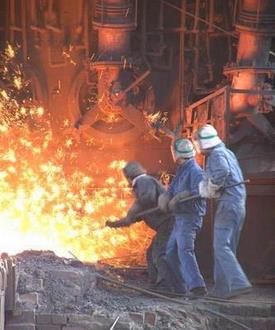
Each October, the China steel sector, represented in recent talks by Shanghai-listed Baosteel (SHA: 600019), begins sit-down negotiations with the world’s three biggest exporters of iron ore: Australia’s Rio Tinto and BHP Billiton, and Vale of Brazil, to hammer out the annual contract price for the key raw material used in the production of finished steel.
For the current contract year, which ends April 1, China has been essentially operating sans contract price as Baosteel’s brinkmanship last time around with the three Uberminers resulted in the mills rejecting a 33% annual price decrease despite Japan and South Korea already agreeing to the terms.
At the time, Baosteel and other industry representatives argued that the country deserved a special “China price” given the fact that it was by far the world’s largest importer of iron ore.
Quite expectedly, the miners called Beijing’s bluff and ended up selling their product to Chinese mills over the past several months on a spot-price basis, which suited the three just fine as at last check, iron ore spot prices were running around 80% higher than the current global contract price.
So just as Baosteel and the Big Three seemed to be entering an intractable stalemate, Beijing suddenly issued a statement saying it hopes both sides can reach a “timely and fair” deal that presents a “win-win” scenario for both mills and miners, according to a Chinese language story in SinaFinance.

China’s Ministry of Industry and Information Technology issued a statement over the weekend urging the negotiating parties to seek a “win-win” resolution to the annual iron ore contract price talks – a common refrain that has lost its teeth due to chronic overuse.
“The three big mining firms should take a long term outlook and effect a beneficial negotiated outcome that is in the interests of both the industry’s stable development and both mills and miners. We hope the miners will appreciate the good feelings and intentions of Chinese steelmakers and help bring about a timely and fair contract price for the coming year that is acceptable to both sides,” said ministry spokesman Zhu Hongren.
He also attempted to talk down the possibility of a drastic contract price hike, as many analysts are predicting.
“China last year imported 630 mln tons of iron ore, up 41.6% from 2008,” Zhu said, suggesting that stockpiles of the commodity were overflowing its ports and the country would not need to import quite as much this year.
However, what this scenario fails to acknowledge is that China’s steel mills were churning out finished product last year at a record pace, backed by the ongoing 4.5 trln yuan stimulus package.
|
|||||||||||||||||
This would suggest that the increased iron ore imports last year were in response to real, on-the-ground demand strength, and that a surplus in the stockpiled commodity was a slim possibility.
The numbers bear this out, as last year the country’s crude steel production rose 13.5% to 568 mln metric tones, a record annual output for a single country.
It allowed China’s share of global steel output to rise nine percentage points year-on-year to 47%.
These are the statistical realities that Beijing is eager to keep off the negotiating table with the Big Three global miners, as they will inevitably point to seemingly insatiable demand for iron ore in China as a justification for a substantial annual contract price hike this time around.
Ever since the parties first sat down in October of last year, there has been a seeming constant string of industry news items that do not augur well for the Chinese side.
Not least among these were a flurry of analyst reports forecasting that the contract price beginning April 1 of this year would rise by up to 50%.
These circulated reports are hardly the type of literature Mr. Zhu and his ministry colleagues want to get into the hands of representatives from Rio Tinto, BHP and Vale, but this is exactly the type of information the miners will be looking for.
The media story also reported that an official with the China Iron & Steel Association (CISA), the state-supported industry group, also recently commented on the current state of the negotiations.
“Recently, China and the Big Three miners have entered into a negotiating stalemate. The Chinese side has expressed its sincere wish that a settlement can be reached soon, one that can help alleviate the impasse between the two sides and be in both parties’ long-term interests,” the official said.
Last year’s benchmark contract for iron was set at 60.4 usd per tonne, excluding freight fees.







